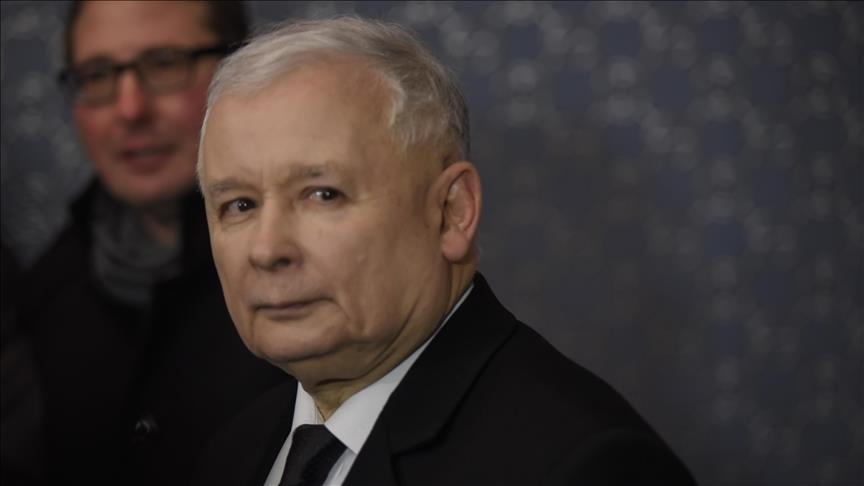
WARSAW
Since President Andrzej Duda set Poland’s parliamentary election for Oct. 15, the ruling Law and Justice (PiS) party has turned its guns on Donald Tusk, the leader of the opposition Civic Platform (PO) and a figure it says is beholden to Germany – and the EU by extension.
“Tusk is the personification of evil in Poland. He is pure evil,” Jaroslaw Kaczynski, PiS leader and the deputy prime minister, said on Monday.
Tusk, who is from the northern Polish city of Gdansk, with historically strong links to Germany, was the president of the European Council from 2014 to 2019, and has been subjected to such name-calling for years.
Kaczynski claimed Tusk wants to abolish the social programs introduced by PiS, raise the retirement age and privatize major companies.
Mariusz Blaszczak, another senior PiS leader and the country’s defense minister, warned that Tusk would remove the fence along the border with Belarus if he comes to power.
“He would get such an order from [Manfred] Weber’s group,” he said, referring to the conservative European People’s Party group in the European Parliament.
With the elections drawing closer, PiS is ahead in most polls, but its lead over PO has narrowed as it faces pressure from its core farming constituency over cheaper Ukrainian grain imports.
According to a recent survey by Pooling the Poles, PiS is at around 35% and the PO has 29%.
Since it came to power, the PiS has raised so-called “culture war” issues such as abortion and LGBTQI+ and women’s rights.
As those could hold less political traction today, observers believe that has pushed the party to talk about border security and external enemies.
“PiS hopes that, by putting Germany under pressure, it can create its own moral narrative that could be used to strengthen Poland’s bargaining position in the international diplomatic arena on various other issues, notably in its ongoing rule-of-law dispute with the EU political establishment,” Aleks Szczerbiak, a professor at the University of Sussex, told Anadolu.
The European Commission has blocked €35 billion ($38 billion) of payments to Warsaw from the EU’s COVID-19 recovery fund because of judicial changes in the country that it claims are against the spirit of the rule of law.
While Poles largely support EU membership, an Ipsos survey for Polish news outlet OKO.press found that 47% of respondents agreed that Germany was using the EU against Poland, while 49% disagreed.
Szczerbiak said it is much easier for the PiS to attack Tusk as “a proxy for the EU” rather than criticize the bloc itself.
“Poles remain overwhelmingly committed to continued membership of the EU, and any hint of supporting ‘Polexit’ would be electoral suicide,” he said.
- War and history
A February survey of the Institute of Public Affairs think tank found the number of Poles who evaluate Polish-German relations positively fell from 72% in 2020 to 48%, while those who viewed them negatively increased from 14% to 35%.
For many Poles, it will take a long time for Berlin to live down its decision to build the Nord Stream 2 pipeline after Russia annexed Crimea in 2014.
In the PiS’ view, the Ukraine war has “exposed the way Germany fatally misjudged” Russian President Vladimir Putin’s plans, said Szczerbiak.
“Also the folly of its attempts to develop economic links with Moscow over the heads of post-communist states such as Poland, exemplified by the Nord Stream pipelines,” he added.
Warsaw has also been critical of what it sees as Germany’s foot-dragging over weapons supplies to Ukraine.
“Germany and France would want Ukraine to win, I have no doubts about this, but to what extent they are able to engage their money, their weapons, their diplomacy to support Ukraine, I’m not sure,” Prime Minister Mateusz Morawiecki said during a trip to the US in April.
Meanwhile, Poland’s preference for a federation of EU nation-states also collides with Berlin’s push for a deeper EU.
When Foreign Minister Zbigniew Rau presented his 2023 policy priorities in April, he said it was Poland’s “duty to strive to give Polish-German relations a shape that could be described as a model.”
However, he suggested Berlin should change its position on the NATO-Russia Founding Act, which restricts deployment of “significant military forces” in new NATO member states.
Poland will reportedly soon replace France as Germany’s fourth-largest trading partner.
While NATO shifts its attention to Ukraine, Poland is widely seen to be a new center of US interest in Europe – and Washington’s growing arms sales to Warsaw serve as a strong indicator.
Warsaw is also seeking €1.3 trillion in reparations from Germany for the Nazi occupation.
German leaders such as President Frank-Walter Steinmeier have said they have a special responsibility toward Poland for Nazi-era crimes, but Berlin has signaled it will not pay.
Poland’s ruling party is using reparations to undermine Germany’s moral narrative that it has come to terms with its Nazi past, according to Szczerbiak.
Anadolu Agency website contains only a portion of the news stories offered to subscribers in the AA News Broadcasting System (HAS), and in summarized form. Please contact us for subscription options.







